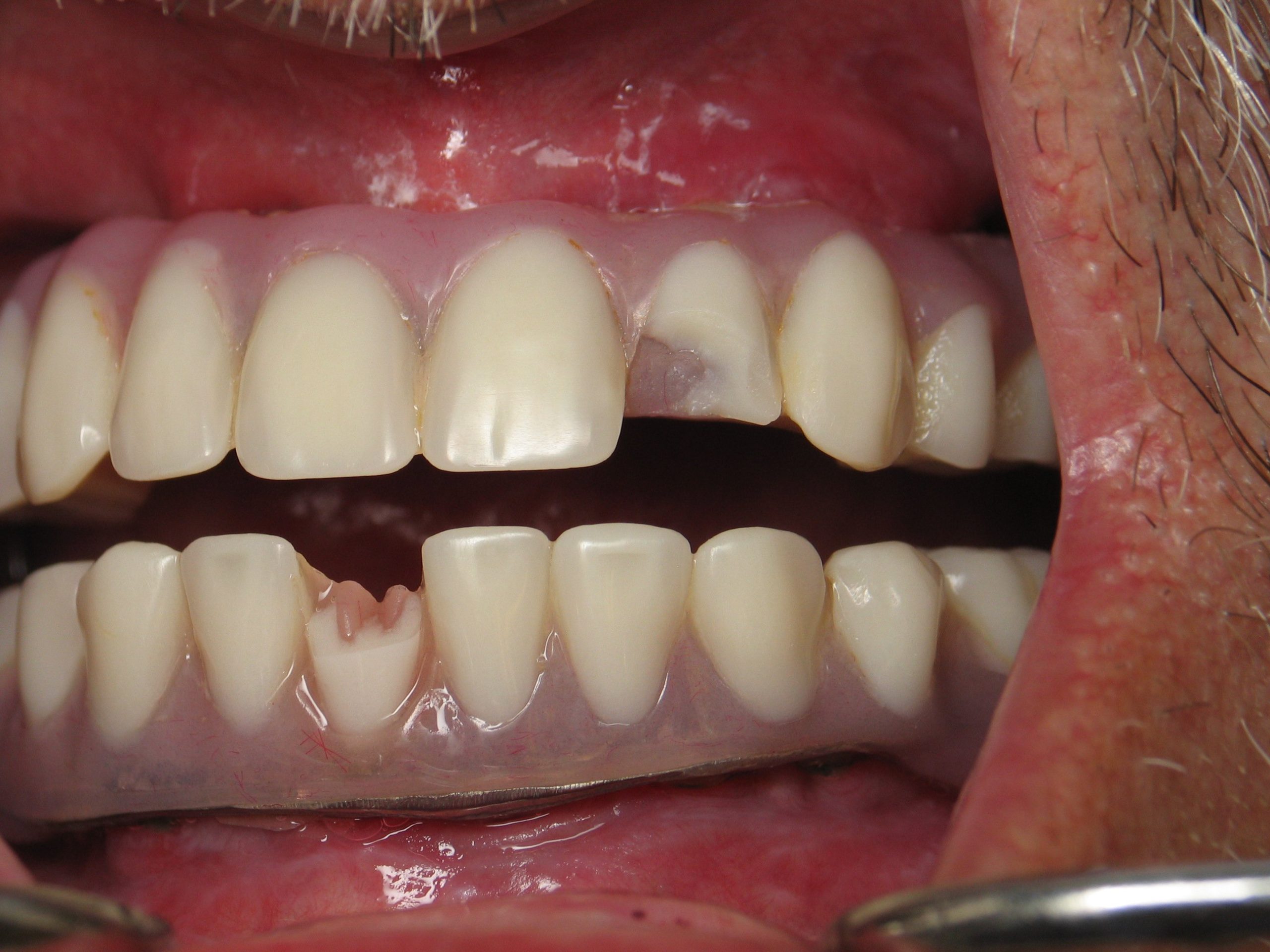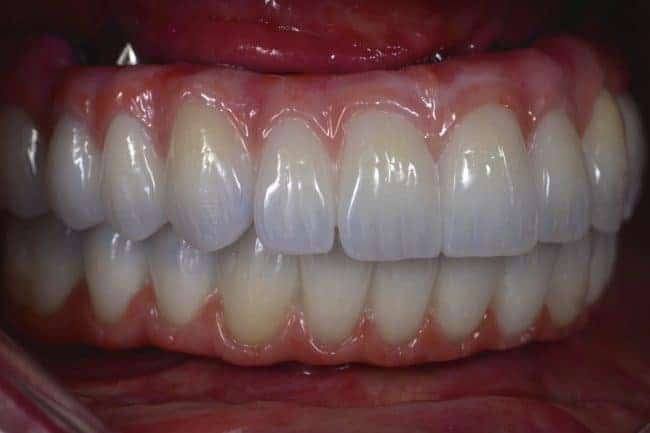Full mouth dental implants will last 10-15 years on the average if oral hygiene is good, the implant surgery is done well and the implant teeth are made of a durable material such as milled Zirconia. If the implant teeth are made of acrylic the teeth may last as little as 3-5 years. Full mouth implants will work with as few as 4 implants per arch, but it is better to use 5 or 6 for added strength and longevity.
We offer a No-Cost Consultation including 3D Xray for Full Mouth Implants
Other Articles About full mouth implants:
- how much does it cost to get full mouth implants
- how do full mouth implants feel
- what do full mouth implants look like
- how long do full mouth implants last
Acrylic vs Zirconia Full Mouth Implant Teeth:

Broken Acrylic Full Mouth Implants
Zirconia full mouth implants can last forever, whereas acrylic teeth (sometimes called a “hybrid denture“) may only lase 3 to 5 years. Zirconia teeth are made by multi-million dollar 3D printers. Acrylic teeth are purchased off the shelf and processed just like dentures. The acrylic teeth are much less expensive.
Dental implant centers such as Clear Choice may use acrylic teeth that are sometimes made in the office. The zirconia teeth are sold as an upgrade. Make sure you know what you are getting. The zirconia teeth may be $10-$15K more, but they are worth the price. Acrylic full mouth teeth wear at a much faster rate and they can break-off at the acrylic base. Acrylic also will absorb stain and bacteria.
There are also some composite and some porcelain-composite teeth that are used for permanent implant teeth. They are both less expensive, but they will also not last as long and can break more easily than pure zirconia implant teeth.
Do the Full Mouth Implants Last Forever?
The actual implants placed into the jaw during full mouth implant surgery usually do last forever as long as the patient has good oral hygiene and the implants are designed and placed well. It is very advisable to use 5 or 6 dental implants per arch and not the bare minimum of 4. Full mouth implants is also called “all on 4” because a full upper or lower set of teeth can be replace with as few as 4 implants. But 6 is better for strength and longevity when supporting a full set of zirconia implant teeth.
It is very rare for a dental implant to fail, but what if it does? If you have 4 implants and you lose one, the entire set of teeth needs to remade and the failed implant needs to be replaced. It is better to have 1 or 2 spare implants.
Are Full Mouth Implants Permanent?
Full mouth dental implants are a permanent solution to replace missing teeth or to support a full set of dentures. They are a popular choice for people who want to restore their smile and improve their oral function. But like any dental procedure, it’s important to know how long the implants are expected to last and what can be done to ensure their longevity.
Dental implants are made of a biocompatible material, typically titanium, which is surgically inserted into the jawbone. The implant serves as a replacement tooth root, and over time, the bone grows around the implant to anchor it in place. Once the implant is securely integrated into the jawbone, a crown or bridge is attached to the implant to complete the restoration.
Implant Longevity Depends on Many Factors
How long full mouth dental implants last depends on a variety of factors, including the quality of the implants, the skill of the surgeon, and the patient’s oral hygiene. In general, dental implants have a success rate of 95-98%. With proper care, they can last a lifetime. However, there are some cases where an implant may need to be replaced after a few years.
High Quality Implants and Surgery Improves Long Term Success
One of the most important factors in the longevity of full mouth dental implants is the quality of the implants themselves. High-quality implants are made from medical-grade titanium and are manufactured to strict standards to ensure their strength and durability. Poor quality implants, on the other hand, may be more prone to failure.
The skill of the surgeon is also important in the success of full mouth dental implants. Dental implants require precise placement in the jawbone to ensure proper integration and support for the restoration. A skilled surgeon will carefully plan the placement of the implants to maximize their stability and longevity.
Oral Hygiene Improves the Lifespan of Dental Implants
Finally, the patient’s oral hygiene is an important factor in the lifespan of full mouth dental implants. Just like natural teeth, dental implants require regular brushing and flossing to remove plaque and prevent gum disease. If the patient does not maintain good oral hygiene, the implants may become loose or infected, which can lead to failure.
In some cases, an implant may need to be replaced after a few years due to infection or other issues. However, this is relatively rare and can often be prevented with good oral hygiene and regular check-ups with the dentist.
To ensure the longevity of full mouth dental implants, it’s important to follow your dentist’s instructions for care and maintenance. This may include brushing and flossing daily, using an antimicrobial mouthwash, and avoiding hard or sticky foods that can damage the implants. It’s also important to see the dentist regularly for check-ups and cleanings to ensure that the implants are in good condition.
In conclusion, full mouth dental implants are a permanent solution for replacing missing teeth or supporting a full set of dentures. With proper care, they can last a lifetime. However, the quality of the implants, the skill of the surgeon, and the patient’s oral hygiene are all important factors in the lifespan of the implants. By following your dentist’s instructions for care and maintenance, you can help ensure that your full mouth dental implants last for many years to come.


